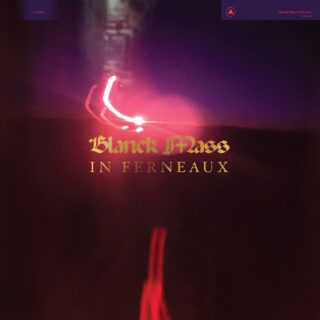Blanck Mass
In Ferneaux
9/10

9/10
On his latest project In Ferneaux, Benjamin John Power suspends us in limbo. Much of his previous work as Blanck Mass derives its power from the brute force of its sensory overload – this is incredibly visceral, physical music, designed to be played out over churning crowds, terrified and exhilarated in equal measure. In Ferneaux mostly breaks from that mould, mirroring the retreat we’ve all had to make from such spaces in the past 12 months, yet traces of previous sociality are discernible in every note. It’s those traces that make up this music’s central eeriness – its tangible absence of something beyond the familiar – and make it so intoxicating.
The raw components of the record are recognisable enough – Power’s hyperactive synths are pursued by his customary snarls of digital distortion and white noise, intermittently broken up by scatty field recordings and disarmingly open piano chords – but it’s their presentation that’s so captivating. It plays out over two “phases”, each 20 minutes long and dense to the point of disorientation. One could just as easily describe the album as having 20 “tracks” as two, although none of it is neatly separable into discrete segments.
The record starts with the opening arpeggios of ‘Phase I’, which shift quickly between barely-suppressed tension and not-quite-release, two modes of being which I’ve definitely had to get used to as the pandemic has ebbed and flowed. It’s a compelling opening salvo, a sort of apocalyptic game show theme that soon starts to decay and break apart, Power never having been an artist to let an idea outstay its welcome. Just as the loops are about to collapse entirely, a thunderous four-to-the-floor seizes the initiative, and we’re briefly plunged into the middle of an equally end-times psytrance rave. When this recedes, we find ourselves on a shoreline somewhere, boats and buoys clanking in the surf, a welcome reprieve.
Much of this phase continues accordingly: fleeting moments of tranquillity interspersed with corrosive heft, snatches of genuinely arresting beauty that are swept aside by torrents of something far more ferocious and unyielding. A decade’s worth of field recordings, captured over the course of Power’s travels with his solo music or as one half of Fuck Buttons, ground his production in the material world, lending the album a certain physicality that makes the demonic synths and broiling sheets of discord all the more invasive and unavoidable. There’s something about the record’s restless pace and distracted intensity that conjures up the feeling of grasping at half-memories in moments of desperation, or indeed of staggering through the pathologies of our embattled present themselves. It’s at once horrifyingly brutal and even more horrifyingly familiar.
‘Phase II’ begins just as savagely, all clipped screaming, indistinct chatter and long-wave interference, before the noise subsides to allow an earnest, yarn-spinning monologue into the foreground, framed by elegiac pads and flecks of reverb. It’s tempting to describe this passage as dreamlike, but that’s to slightly underplay its semi-conscious, somnambulant quality; it’s more evocative of the experience of beginning to wake up on an already-busy morning, the conversations of passers-by outside or the natter of a clock radio wheedling their way into your slumbering brain. Like those brief periods of half-sentience, this section finishes all too quickly, and we’re in the throes of hiss and corrosion again, passing swells of discord and pacification as we’re dragged along by the unrelenting current. Power doesn’t let up at any point – it’d feel rushed and messy were each passage not so rich and minutely detailed.
The album’s press release describes Power as working with “the immanent materials of the here-and-now”. This doesn’t quite capture what’s going on here. Perhaps there is a sense in which the sounds that populate the record are immediate and inherent to the present moment, but only to the extent that they were literally to hand at the time, having been recorded earlier or extracted from equipment that Power already had. Their prevailing affective quality has much less to do with the here-and-now than it simultaneously has with the recent past and a hoped-for near future. It regards pre-pandemic society without any real nostalgia or sentiment, more a clear-eyed observation that the previous status quo has been irrevocably altered. What’s so powerful about it, though, is its sense that elements of that status quo will be returning, and not all of them good. Its eeriness, its central absence, is at once temporary, as it looks towards a future to which some of the things we miss will return, and fundamentally permanent – after all, there are a lot of things, namely an abjectly large and growing number of people, that will not be coming back when the virus finally loosens its grip. For those of us lucky enough to be in limbo for a while, this is a moving, unsettling piece of work from a singular talent; for far too many others, it may at least be some form of tribute.